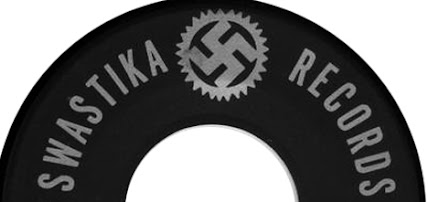One of the most spectacular pivots from a terrible idea to a great one occurred with this short-lived Wisconsin record label that was not only called Swastika Records but also prominently featured a swastika symbol in the logo.
Existing for only two months in 1959, the label was an imprint of Jim Kirchstein of Sauk City, Wisconsin, and became a longstanding source of dismay to Kirchstein, who later believed that the FBI investigated him because of it. Turning lemons into lemonade, Kirschstein quickly abandoned the Swastika label and renamed it Cuca Records, which—as many oldies fans know—became the center of regional independent music making in Wisconsin and achieved national fame with artists such as The Fendermen, whose "Mule Skinner Blues" was a Top 5 pop hit in 1960.
But we're getting ahead of ourselves. First came Swastika Records, which Kirchstein says he innocently, if naively, named in recognition of the large German-American population in Wisconsin and in reference to the traditional meaning of the swastika as a symbol of good luck. He explained his rationale for the name in Gary E. Myers' book Do You Hear that Beat: Wisconsin Pop/Rock in the 50's & 60's:
'That was a very dumb thing I did,' said Kirchstein. 'This was in the 50's and the horrors of World War II were just 15 years before that. I had the idea of creating a series of German related type music and the swastika was basically a symbol of good luck, a symbol of the sun.'
Swastika Records endured long enough to release only two singles: one by the Midwest Ranchers (Swastika 1000) and one by Willy Tremain's Thunderbirds (Swastika 1001).
The Midwest Ranchers were a country combo with a trumpeter, and their Swastika single was the only record they released. (Steel guitarist Leroy Gilbertson later released a solo single on Cuca in 1962.) The Midwest Ranchers' single contained remakes of the Gene Autry and Smiley Burnette song "Riding Down the Canyon" and Carl Smith's 1950 country hit "I Overlooked an Orchard." Kirchstein paid RCA's pressing plant in Chicago to manufacture 300 copies.
In this label image from Discogs, someone tried to black out the swastika symbol with a marker!
Swastika's other single, the rock 'n' roll instrumental "Midnight Express" by Willy Tremain's Thunderbirds, was again pressed at the RCA plant in an initial batch of 300.
The record was a good seller, so Kirchstein went to RCA to press another batch of 300. This time, RCA raised objections to the label's name and logo:
...[A]fter he placed an order for more copies of the release, his RCA contact, Bill Leonards found a problem with the records. The original label name chosen for Kirchstein's releases was Swastika and the records' paper labels included the symbol in their artwork, causing workers and management at the RCA facility to feel uncomfortable with the Nazi association. Kirchstein maintained that he chose the Swastika insignia because the large German population of Sauk City considered it a good luck sign. He had no intention of conjuring up pro-Nazi sentiments through his record business. (In later years, he believed the FBI investigated his activities based solely on this "dumb thing" he did.) Impulsively, Kirchstein decided while on the telephone with Leonards to rename his business Cuca, the nickname of his wife's Mexican-American cousin from Los Cusas, New Mexico.[1]With the founding of Cuca Records, the Swastika name and logo were abandoned, and Willy Tremain's Thunderbirds became the first artist on Cuca, with the spelling of Tremain's first name changed from Willy to Willie.
In its entry on Tremain, Gary E. Myers' second book on Wisconsin music, On that Wisconsin Beat: More Pop/Rock/Soul/Country, contains a follow-up anecdote about the Swastika label:
In 1995 [Tremain] obtained several copies of his 36-year old disc. 'We used to hire these kids to sell the records at our dances,' he explains. 'A few years ago my brother ran into one of those guys who still had a box of autographed copies on Swastika.' Jim Kirchstein laughingly said he wanted to get them and burn them - Jerry Osborn's 1999 price guide listed the disc at $200-$300.
According to Myers' book, even though the catalog numbers suggest that the Midwest Ranchers' record preceded the one by Tremain's Thunderbirds, Tremain's record was released in July 1959 and the Midwest Ranchers' record in August 1959. Cuca's debut, the reissue of the Tremain record, was also released in August 1959.
By the way, any music lovers who are interested in Myers' highly informative books on Wisconsin music of the '50s and '60s should visit his website where he's offering both of them at clearance prices.





